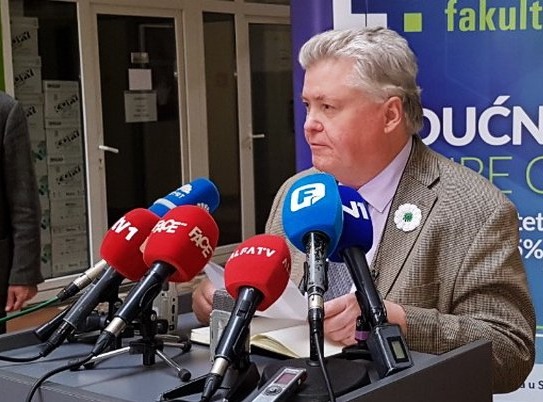
Trouble in the Balkans: Republika Srpska and the Failure of the International Community in Bosnia and Herzegovina presented by David Pettigrew, Professor of Philosophy, Southern Connecticut State University.
In 1992, Republika Srpska declared itself as an autonomous territory within Bosnia and Herzegovina. For the next three years, Republika Srpska sought to establish itself as an ethnically homogeneous entity through terror, forcible displacement, murder, and other atrocities directed at non-Serbs [Bosnian Muslims and Bosnian Croats]. Following its recognition by the 1995 Dayton Peace Accords as an entity within Bosnia, the founders of Republika Srpska were convicted of Genocide, Crimes against Humanity and other war crimes. However, since 1995, Republika Srpska’s leadership has engaged in genocide denial, the glorification of war criminals, human rights violations, and threats of secession, in an ongoing effort to achieve its original goal of ethnic homogeneity and to destabilize Bosnia and Herzegovina. The international community seems incapable of responding to the divisive tactics of Republika Srpska, or of achieving restorative justice, reconciliation, or nation-building in Bosnia and Herzegovina. This inaction has contributed to the further destabilization of the region, with perilous implications. With this history, what can the future portend for Bosnia and Herzegovina, and for the Balkans?
David Pettigrew, Ph.D., is Professor of Philosophy at Southern Connecticut State University in New Haven, CT, where he also teaches Holocaust and Genocide Studies. He lectures and writes about the genocide in Bosnia and Herzegovina. His essay, “The Suppression of Cultural Memory and Identity in Bosnia and Herzegovina,” for example, appeared in 2018 in Multidisciplinary Perspectives on Genocide and Memory, and he has presented invited lectures on the topic in recent years in Prague, Sarajevo, and Stockholm. His documentary film, “The Geography of Genocide in Bosnia: Redeeming the Earth,” created with his son Jonah, was an official selection for the Srebrenica International Film Festival in 2011. In August 2010, he accompanied Bosnia’s Missing Persons Institute to witness and document the exhumation of victims of the genocide from the Drina River in Višegrad. In 2012, he served as a credentialed international observer for the local elections in Srebrenica. He was a consultant for the completion of the first comprehensive educational exhibition about the Srebrenica Genocide: “Srebrenica Genocide: The Failure of the International Community,” at the Srebrenica-Potočari Memorial Center in 2017. He has written op-ed essays about human rights violations in Republika Srpska for Al Jazeera Balkans, and has authored open letters of concern on these topics to officials at the United Nations and at the International Criminal Tribunal for the Former Yugoslavia. He has been interviewed about the discriminatory prohibition of memorials for the victims of the genocide, about genocide denial, and about the glorification of war criminals, by Bosnia-based and other international media. Pettigrew is a member of the Board of the Bosnian-American Genocide Institute and Education Center in Chicago, of the International Expert Team of the Institute for Research of Genocide Canada, of the Steering Committee of the Yale University Genocide Studies Program, and of KRUG 99, an association of independent intellectuals founded during the siege of Sarajevo. Professor Pettigrew is a Vice President of the Connecticut Academy of Arts and Sciences. In June 2018, he was appointed as a member of the Connecticut Department of Education Holocaust and Genocide Education Advisory Committee. In this capacity, he supports Connecticut Public School Districts as they respond to the new State mandate (Public Act 18-24) requiring the inclusion of Holocaust and Genocide Education and Awareness in the Social Studies Curriculum. He has also co-edited or co-translated twelve books bearing on French philosophy and psychoanalysis. His co-translation of Dominique Janicaud’s Heidegger in France, Indiana University Press, 2015, was a finalist for the 2015 French-American Foundation Translation Prize. He is co-editor of the book series Contemporary French Thought, published by SUNY Press.
Dinner followed for CAAS members and guests. (Dinner fee is $38/person)